The Travel and Tourism Business Toolkit
VerifiedAdded on 2023/06/15
|13
|3937
|457
AI Summary
This report covers principles of revenue management and revenue management tools that help business to generate and maximise profits. HR life cycle and performance management plan for travel and tourism organisation is explained. Along with that, different legislations and how employment as well as contract law impact business decision-making are mentioned. Furthermore, different types of financial statements and important of budgets for controlling performance of business are discussed in this project report.
Contribute Materials
Your contribution can guide someone’s learning journey. Share your
documents today.
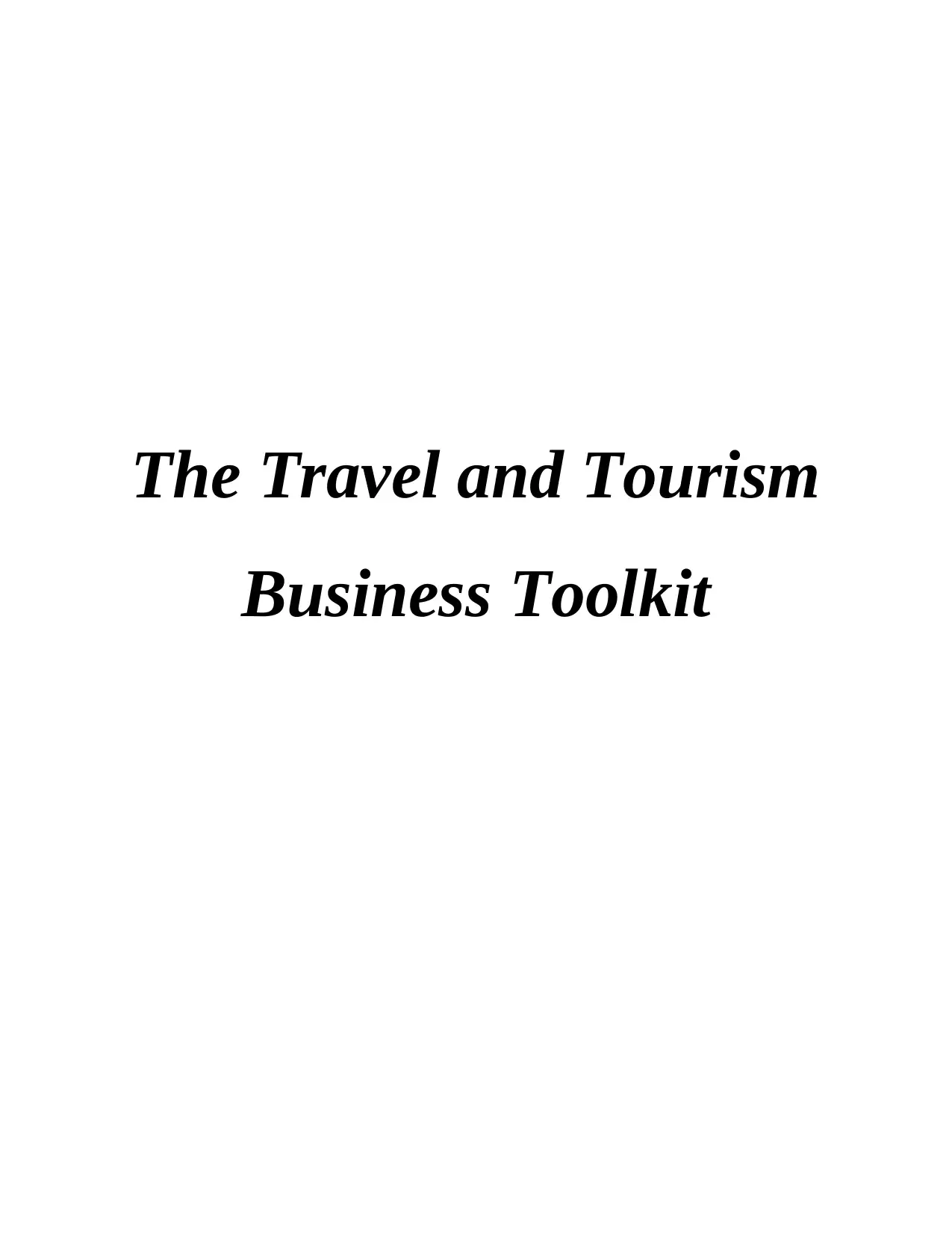
The Travel and Tourism
Business Toolkit
Business Toolkit
Secure Best Marks with AI Grader
Need help grading? Try our AI Grader for instant feedback on your assignments.
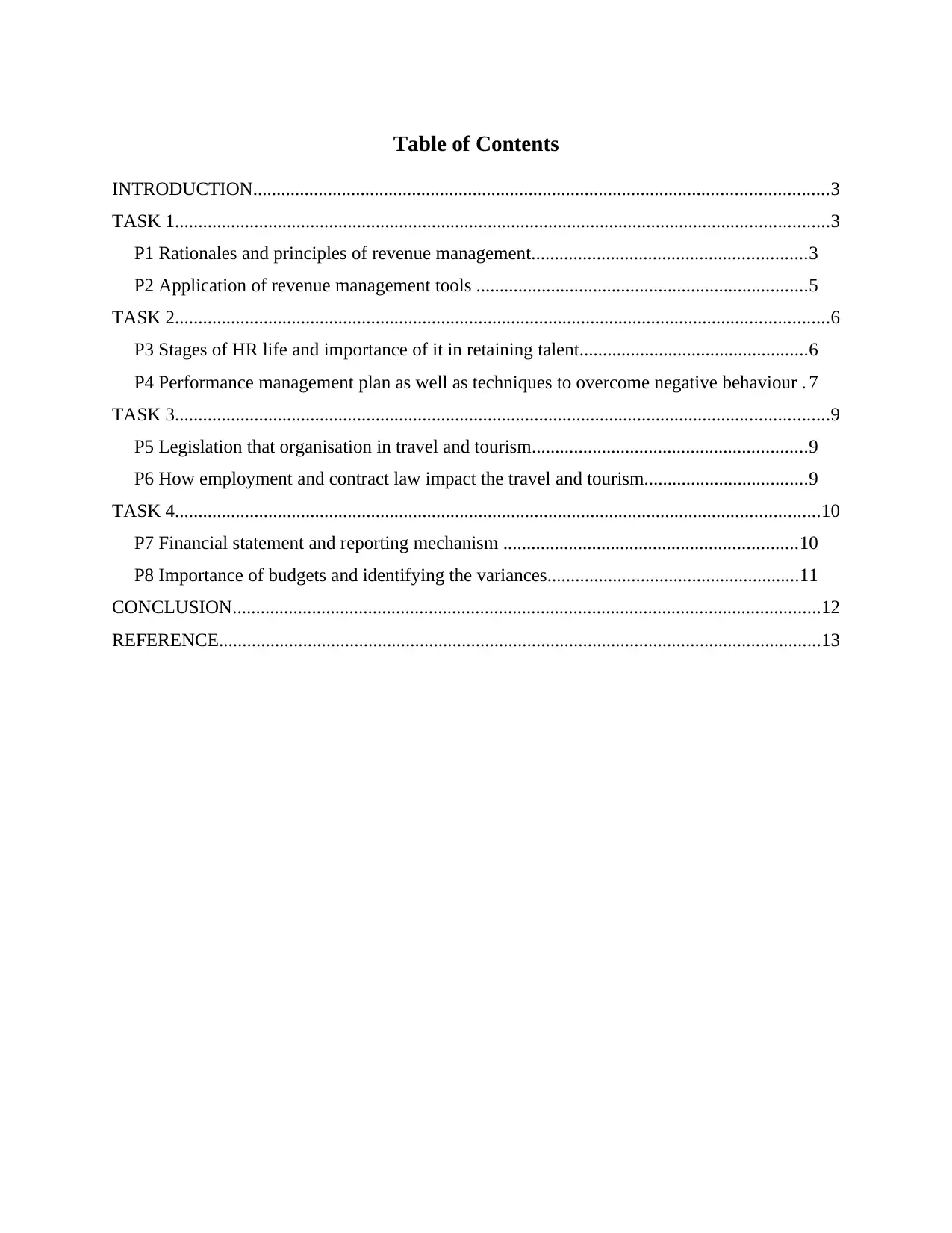
Table of Contents
INTRODUCTION...........................................................................................................................3
TASK 1............................................................................................................................................3
P1 Rationales and principles of revenue management...........................................................3
P2 Application of revenue management tools .......................................................................5
TASK 2............................................................................................................................................6
P3 Stages of HR life and importance of it in retaining talent.................................................6
P4 Performance management plan as well as techniques to overcome negative behaviour . 7
TASK 3............................................................................................................................................9
P5 Legislation that organisation in travel and tourism...........................................................9
P6 How employment and contract law impact the travel and tourism...................................9
TASK 4..........................................................................................................................................10
P7 Financial statement and reporting mechanism ...............................................................10
P8 Importance of budgets and identifying the variances......................................................11
CONCLUSION..............................................................................................................................12
REFERENCE.................................................................................................................................13
INTRODUCTION...........................................................................................................................3
TASK 1............................................................................................................................................3
P1 Rationales and principles of revenue management...........................................................3
P2 Application of revenue management tools .......................................................................5
TASK 2............................................................................................................................................6
P3 Stages of HR life and importance of it in retaining talent.................................................6
P4 Performance management plan as well as techniques to overcome negative behaviour . 7
TASK 3............................................................................................................................................9
P5 Legislation that organisation in travel and tourism...........................................................9
P6 How employment and contract law impact the travel and tourism...................................9
TASK 4..........................................................................................................................................10
P7 Financial statement and reporting mechanism ...............................................................10
P8 Importance of budgets and identifying the variances......................................................11
CONCLUSION..............................................................................................................................12
REFERENCE.................................................................................................................................13
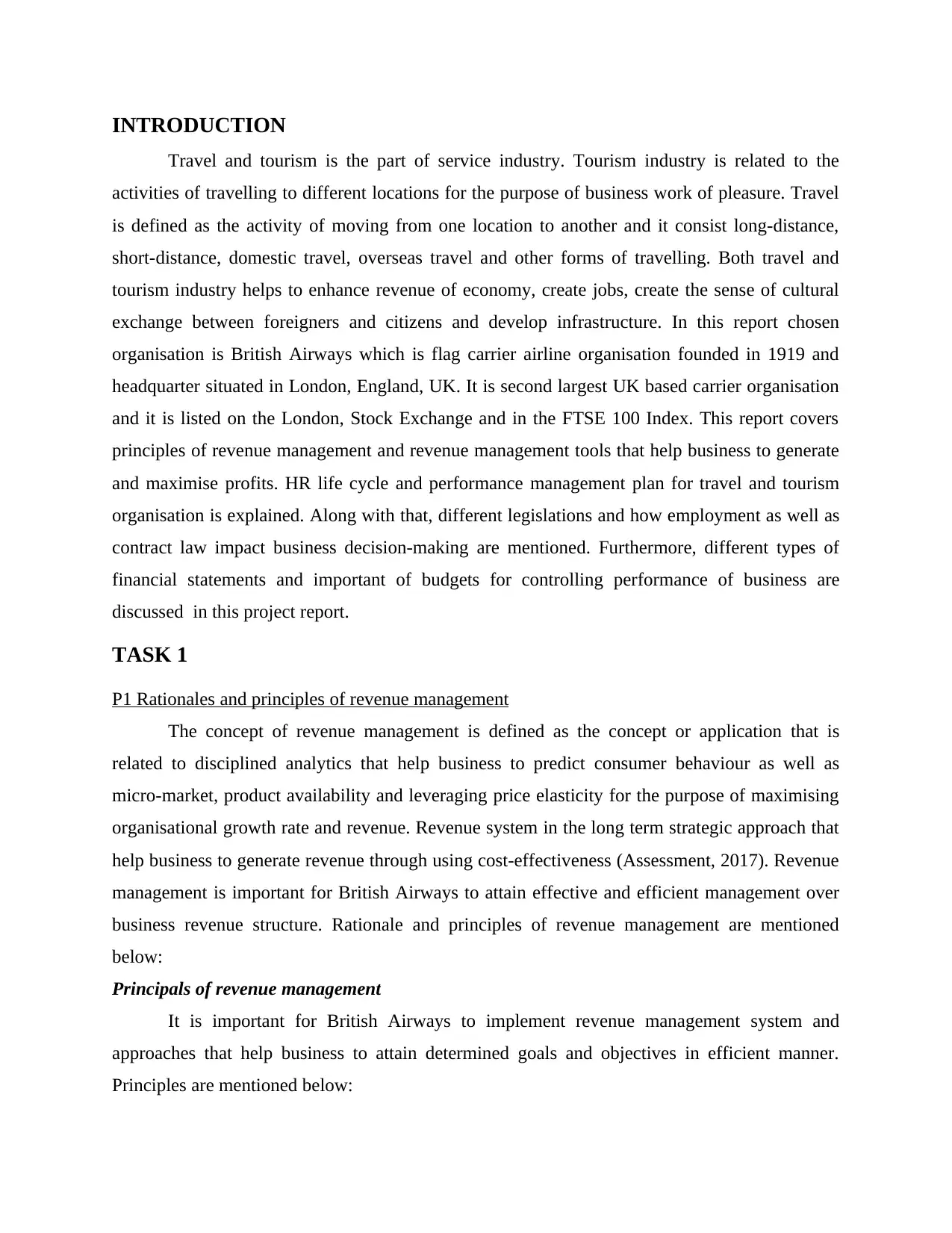
INTRODUCTION
Travel and tourism is the part of service industry. Tourism industry is related to the
activities of travelling to different locations for the purpose of business work of pleasure. Travel
is defined as the activity of moving from one location to another and it consist long-distance,
short-distance, domestic travel, overseas travel and other forms of travelling. Both travel and
tourism industry helps to enhance revenue of economy, create jobs, create the sense of cultural
exchange between foreigners and citizens and develop infrastructure. In this report chosen
organisation is British Airways which is flag carrier airline organisation founded in 1919 and
headquarter situated in London, England, UK. It is second largest UK based carrier organisation
and it is listed on the London, Stock Exchange and in the FTSE 100 Index. This report covers
principles of revenue management and revenue management tools that help business to generate
and maximise profits. HR life cycle and performance management plan for travel and tourism
organisation is explained. Along with that, different legislations and how employment as well as
contract law impact business decision-making are mentioned. Furthermore, different types of
financial statements and important of budgets for controlling performance of business are
discussed in this project report.
TASK 1
P1 Rationales and principles of revenue management
The concept of revenue management is defined as the concept or application that is
related to disciplined analytics that help business to predict consumer behaviour as well as
micro-market, product availability and leveraging price elasticity for the purpose of maximising
organisational growth rate and revenue. Revenue system in the long term strategic approach that
help business to generate revenue through using cost-effectiveness (Assessment, 2017). Revenue
management is important for British Airways to attain effective and efficient management over
business revenue structure. Rationale and principles of revenue management are mentioned
below:
Principals of revenue management
It is important for British Airways to implement revenue management system and
approaches that help business to attain determined goals and objectives in efficient manner.
Principles are mentioned below:
Travel and tourism is the part of service industry. Tourism industry is related to the
activities of travelling to different locations for the purpose of business work of pleasure. Travel
is defined as the activity of moving from one location to another and it consist long-distance,
short-distance, domestic travel, overseas travel and other forms of travelling. Both travel and
tourism industry helps to enhance revenue of economy, create jobs, create the sense of cultural
exchange between foreigners and citizens and develop infrastructure. In this report chosen
organisation is British Airways which is flag carrier airline organisation founded in 1919 and
headquarter situated in London, England, UK. It is second largest UK based carrier organisation
and it is listed on the London, Stock Exchange and in the FTSE 100 Index. This report covers
principles of revenue management and revenue management tools that help business to generate
and maximise profits. HR life cycle and performance management plan for travel and tourism
organisation is explained. Along with that, different legislations and how employment as well as
contract law impact business decision-making are mentioned. Furthermore, different types of
financial statements and important of budgets for controlling performance of business are
discussed in this project report.
TASK 1
P1 Rationales and principles of revenue management
The concept of revenue management is defined as the concept or application that is
related to disciplined analytics that help business to predict consumer behaviour as well as
micro-market, product availability and leveraging price elasticity for the purpose of maximising
organisational growth rate and revenue. Revenue system in the long term strategic approach that
help business to generate revenue through using cost-effectiveness (Assessment, 2017). Revenue
management is important for British Airways to attain effective and efficient management over
business revenue structure. Rationale and principles of revenue management are mentioned
below:
Principals of revenue management
It is important for British Airways to implement revenue management system and
approaches that help business to attain determined goals and objectives in efficient manner.
Principles are mentioned below:
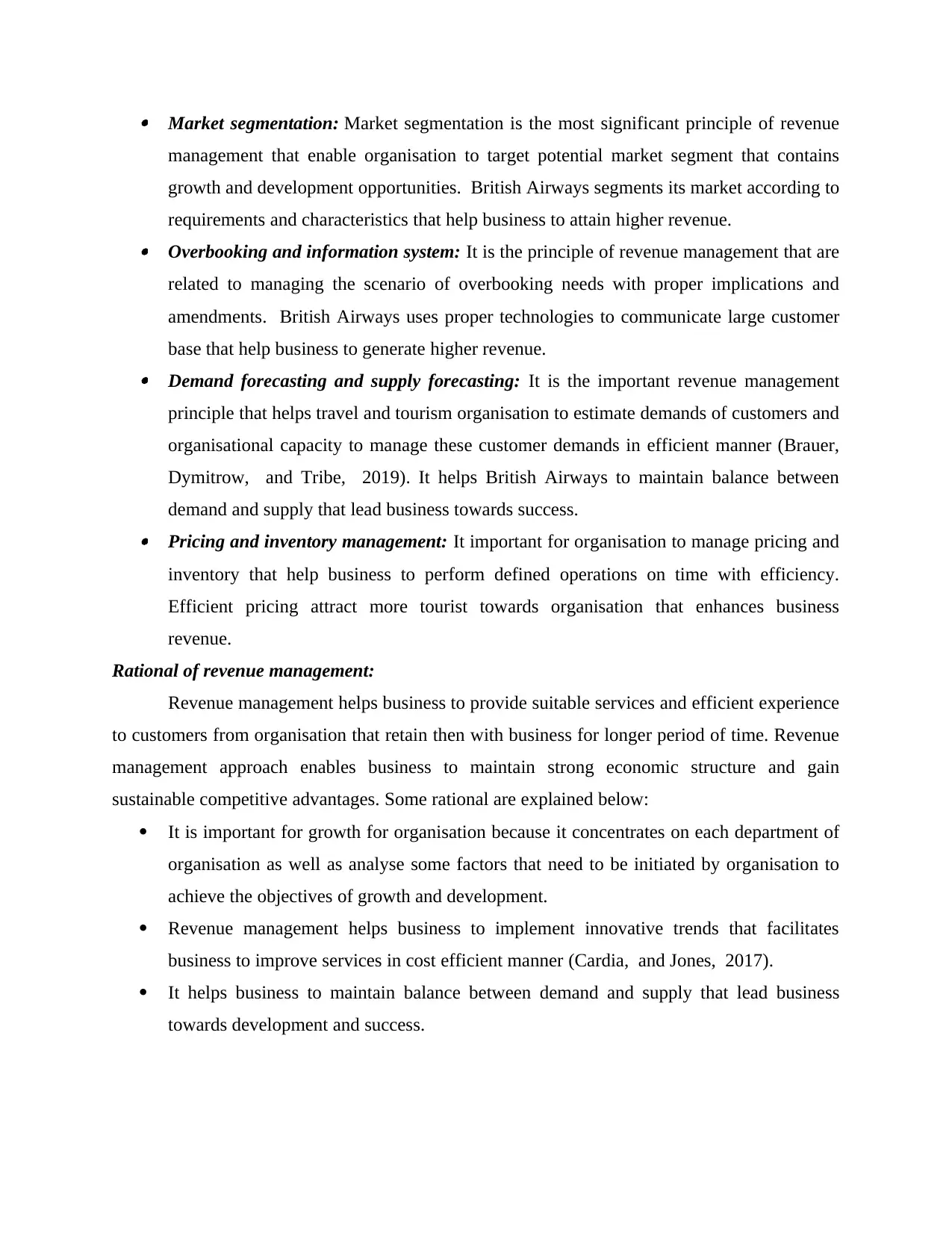
Market segmentation: Market segmentation is the most significant principle of revenue
management that enable organisation to target potential market segment that contains
growth and development opportunities. British Airways segments its market according to
requirements and characteristics that help business to attain higher revenue. Overbooking and information system: It is the principle of revenue management that are
related to managing the scenario of overbooking needs with proper implications and
amendments. British Airways uses proper technologies to communicate large customer
base that help business to generate higher revenue. Demand forecasting and supply forecasting: It is the important revenue management
principle that helps travel and tourism organisation to estimate demands of customers and
organisational capacity to manage these customer demands in efficient manner (Brauer,
Dymitrow, and Tribe, 2019). It helps British Airways to maintain balance between
demand and supply that lead business towards success. Pricing and inventory management: It important for organisation to manage pricing and
inventory that help business to perform defined operations on time with efficiency.
Efficient pricing attract more tourist towards organisation that enhances business
revenue.
Rational of revenue management:
Revenue management helps business to provide suitable services and efficient experience
to customers from organisation that retain then with business for longer period of time. Revenue
management approach enables business to maintain strong economic structure and gain
sustainable competitive advantages. Some rational are explained below:
It is important for growth for organisation because it concentrates on each department of
organisation as well as analyse some factors that need to be initiated by organisation to
achieve the objectives of growth and development.
Revenue management helps business to implement innovative trends that facilitates
business to improve services in cost efficient manner (Cardia, and Jones, 2017).
It helps business to maintain balance between demand and supply that lead business
towards development and success.
management that enable organisation to target potential market segment that contains
growth and development opportunities. British Airways segments its market according to
requirements and characteristics that help business to attain higher revenue. Overbooking and information system: It is the principle of revenue management that are
related to managing the scenario of overbooking needs with proper implications and
amendments. British Airways uses proper technologies to communicate large customer
base that help business to generate higher revenue. Demand forecasting and supply forecasting: It is the important revenue management
principle that helps travel and tourism organisation to estimate demands of customers and
organisational capacity to manage these customer demands in efficient manner (Brauer,
Dymitrow, and Tribe, 2019). It helps British Airways to maintain balance between
demand and supply that lead business towards success. Pricing and inventory management: It important for organisation to manage pricing and
inventory that help business to perform defined operations on time with efficiency.
Efficient pricing attract more tourist towards organisation that enhances business
revenue.
Rational of revenue management:
Revenue management helps business to provide suitable services and efficient experience
to customers from organisation that retain then with business for longer period of time. Revenue
management approach enables business to maintain strong economic structure and gain
sustainable competitive advantages. Some rational are explained below:
It is important for growth for organisation because it concentrates on each department of
organisation as well as analyse some factors that need to be initiated by organisation to
achieve the objectives of growth and development.
Revenue management helps business to implement innovative trends that facilitates
business to improve services in cost efficient manner (Cardia, and Jones, 2017).
It helps business to maintain balance between demand and supply that lead business
towards development and success.
Secure Best Marks with AI Grader
Need help grading? Try our AI Grader for instant feedback on your assignments.
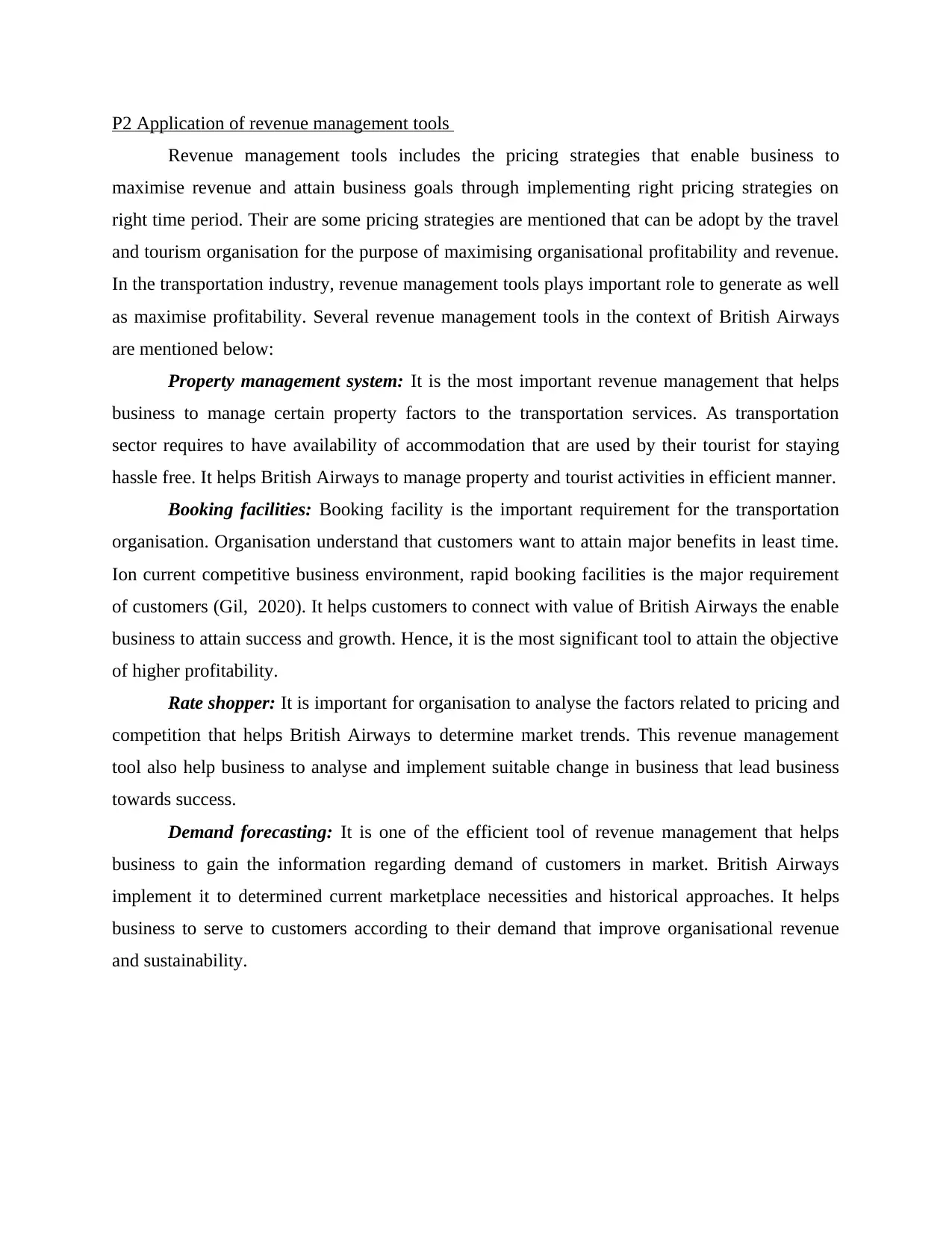
P2 Application of revenue management tools
Revenue management tools includes the pricing strategies that enable business to
maximise revenue and attain business goals through implementing right pricing strategies on
right time period. Their are some pricing strategies are mentioned that can be adopt by the travel
and tourism organisation for the purpose of maximising organisational profitability and revenue.
In the transportation industry, revenue management tools plays important role to generate as well
as maximise profitability. Several revenue management tools in the context of British Airways
are mentioned below:
Property management system: It is the most important revenue management that helps
business to manage certain property factors to the transportation services. As transportation
sector requires to have availability of accommodation that are used by their tourist for staying
hassle free. It helps British Airways to manage property and tourist activities in efficient manner.
Booking facilities: Booking facility is the important requirement for the transportation
organisation. Organisation understand that customers want to attain major benefits in least time.
Ion current competitive business environment, rapid booking facilities is the major requirement
of customers (Gil, 2020). It helps customers to connect with value of British Airways the enable
business to attain success and growth. Hence, it is the most significant tool to attain the objective
of higher profitability.
Rate shopper: It is important for organisation to analyse the factors related to pricing and
competition that helps British Airways to determine market trends. This revenue management
tool also help business to analyse and implement suitable change in business that lead business
towards success.
Demand forecasting: It is one of the efficient tool of revenue management that helps
business to gain the information regarding demand of customers in market. British Airways
implement it to determined current marketplace necessities and historical approaches. It helps
business to serve to customers according to their demand that improve organisational revenue
and sustainability.
Revenue management tools includes the pricing strategies that enable business to
maximise revenue and attain business goals through implementing right pricing strategies on
right time period. Their are some pricing strategies are mentioned that can be adopt by the travel
and tourism organisation for the purpose of maximising organisational profitability and revenue.
In the transportation industry, revenue management tools plays important role to generate as well
as maximise profitability. Several revenue management tools in the context of British Airways
are mentioned below:
Property management system: It is the most important revenue management that helps
business to manage certain property factors to the transportation services. As transportation
sector requires to have availability of accommodation that are used by their tourist for staying
hassle free. It helps British Airways to manage property and tourist activities in efficient manner.
Booking facilities: Booking facility is the important requirement for the transportation
organisation. Organisation understand that customers want to attain major benefits in least time.
Ion current competitive business environment, rapid booking facilities is the major requirement
of customers (Gil, 2020). It helps customers to connect with value of British Airways the enable
business to attain success and growth. Hence, it is the most significant tool to attain the objective
of higher profitability.
Rate shopper: It is important for organisation to analyse the factors related to pricing and
competition that helps British Airways to determine market trends. This revenue management
tool also help business to analyse and implement suitable change in business that lead business
towards success.
Demand forecasting: It is one of the efficient tool of revenue management that helps
business to gain the information regarding demand of customers in market. British Airways
implement it to determined current marketplace necessities and historical approaches. It helps
business to serve to customers according to their demand that improve organisational revenue
and sustainability.
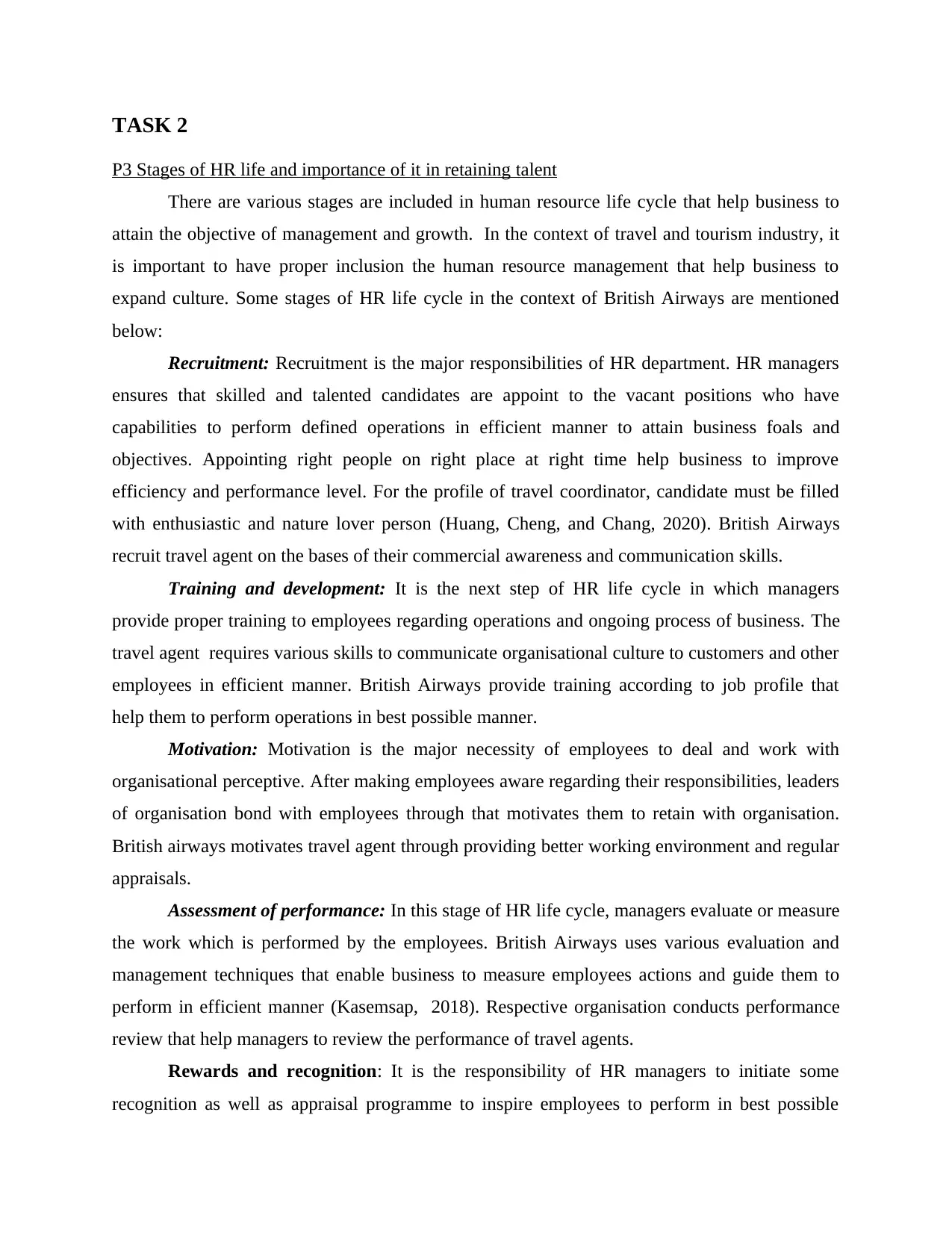
TASK 2
P3 Stages of HR life and importance of it in retaining talent
There are various stages are included in human resource life cycle that help business to
attain the objective of management and growth. In the context of travel and tourism industry, it
is important to have proper inclusion the human resource management that help business to
expand culture. Some stages of HR life cycle in the context of British Airways are mentioned
below:
Recruitment: Recruitment is the major responsibilities of HR department. HR managers
ensures that skilled and talented candidates are appoint to the vacant positions who have
capabilities to perform defined operations in efficient manner to attain business foals and
objectives. Appointing right people on right place at right time help business to improve
efficiency and performance level. For the profile of travel coordinator, candidate must be filled
with enthusiastic and nature lover person (Huang, Cheng, and Chang, 2020). British Airways
recruit travel agent on the bases of their commercial awareness and communication skills.
Training and development: It is the next step of HR life cycle in which managers
provide proper training to employees regarding operations and ongoing process of business. The
travel agent requires various skills to communicate organisational culture to customers and other
employees in efficient manner. British Airways provide training according to job profile that
help them to perform operations in best possible manner.
Motivation: Motivation is the major necessity of employees to deal and work with
organisational perceptive. After making employees aware regarding their responsibilities, leaders
of organisation bond with employees through that motivates them to retain with organisation.
British airways motivates travel agent through providing better working environment and regular
appraisals.
Assessment of performance: In this stage of HR life cycle, managers evaluate or measure
the work which is performed by the employees. British Airways uses various evaluation and
management techniques that enable business to measure employees actions and guide them to
perform in efficient manner (Kasemsap, 2018). Respective organisation conducts performance
review that help managers to review the performance of travel agents.
Rewards and recognition: It is the responsibility of HR managers to initiate some
recognition as well as appraisal programme to inspire employees to perform in best possible
P3 Stages of HR life and importance of it in retaining talent
There are various stages are included in human resource life cycle that help business to
attain the objective of management and growth. In the context of travel and tourism industry, it
is important to have proper inclusion the human resource management that help business to
expand culture. Some stages of HR life cycle in the context of British Airways are mentioned
below:
Recruitment: Recruitment is the major responsibilities of HR department. HR managers
ensures that skilled and talented candidates are appoint to the vacant positions who have
capabilities to perform defined operations in efficient manner to attain business foals and
objectives. Appointing right people on right place at right time help business to improve
efficiency and performance level. For the profile of travel coordinator, candidate must be filled
with enthusiastic and nature lover person (Huang, Cheng, and Chang, 2020). British Airways
recruit travel agent on the bases of their commercial awareness and communication skills.
Training and development: It is the next step of HR life cycle in which managers
provide proper training to employees regarding operations and ongoing process of business. The
travel agent requires various skills to communicate organisational culture to customers and other
employees in efficient manner. British Airways provide training according to job profile that
help them to perform operations in best possible manner.
Motivation: Motivation is the major necessity of employees to deal and work with
organisational perceptive. After making employees aware regarding their responsibilities, leaders
of organisation bond with employees through that motivates them to retain with organisation.
British airways motivates travel agent through providing better working environment and regular
appraisals.
Assessment of performance: In this stage of HR life cycle, managers evaluate or measure
the work which is performed by the employees. British Airways uses various evaluation and
management techniques that enable business to measure employees actions and guide them to
perform in efficient manner (Kasemsap, 2018). Respective organisation conducts performance
review that help managers to review the performance of travel agents.
Rewards and recognition: It is the responsibility of HR managers to initiate some
recognition as well as appraisal programme to inspire employees to perform in best possible
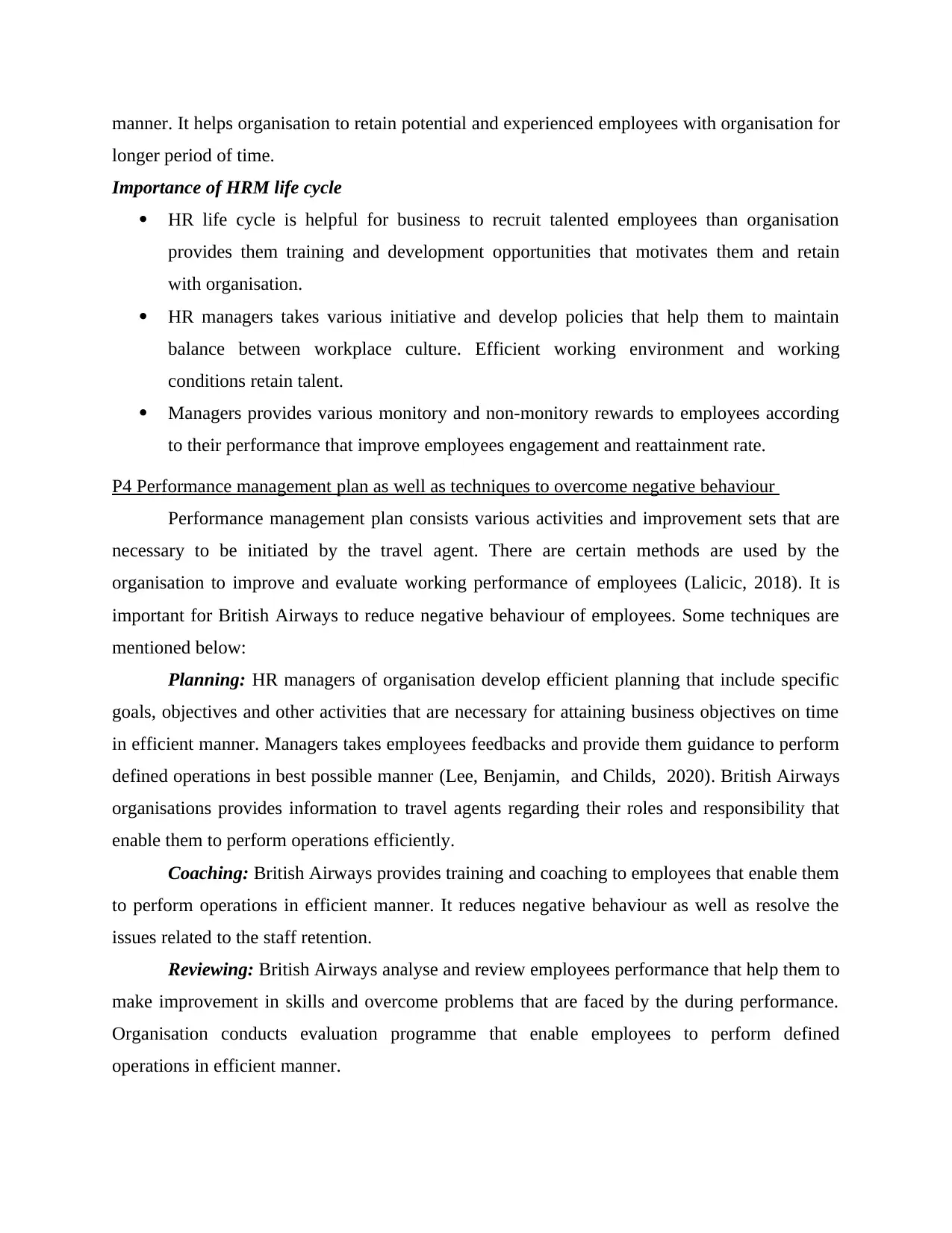
manner. It helps organisation to retain potential and experienced employees with organisation for
longer period of time.
Importance of HRM life cycle
HR life cycle is helpful for business to recruit talented employees than organisation
provides them training and development opportunities that motivates them and retain
with organisation.
HR managers takes various initiative and develop policies that help them to maintain
balance between workplace culture. Efficient working environment and working
conditions retain talent.
Managers provides various monitory and non-monitory rewards to employees according
to their performance that improve employees engagement and reattainment rate.
P4 Performance management plan as well as techniques to overcome negative behaviour
Performance management plan consists various activities and improvement sets that are
necessary to be initiated by the travel agent. There are certain methods are used by the
organisation to improve and evaluate working performance of employees (Lalicic, 2018). It is
important for British Airways to reduce negative behaviour of employees. Some techniques are
mentioned below:
Planning: HR managers of organisation develop efficient planning that include specific
goals, objectives and other activities that are necessary for attaining business objectives on time
in efficient manner. Managers takes employees feedbacks and provide them guidance to perform
defined operations in best possible manner (Lee, Benjamin, and Childs, 2020). British Airways
organisations provides information to travel agents regarding their roles and responsibility that
enable them to perform operations efficiently.
Coaching: British Airways provides training and coaching to employees that enable them
to perform operations in efficient manner. It reduces negative behaviour as well as resolve the
issues related to the staff retention.
Reviewing: British Airways analyse and review employees performance that help them to
make improvement in skills and overcome problems that are faced by the during performance.
Organisation conducts evaluation programme that enable employees to perform defined
operations in efficient manner.
longer period of time.
Importance of HRM life cycle
HR life cycle is helpful for business to recruit talented employees than organisation
provides them training and development opportunities that motivates them and retain
with organisation.
HR managers takes various initiative and develop policies that help them to maintain
balance between workplace culture. Efficient working environment and working
conditions retain talent.
Managers provides various monitory and non-monitory rewards to employees according
to their performance that improve employees engagement and reattainment rate.
P4 Performance management plan as well as techniques to overcome negative behaviour
Performance management plan consists various activities and improvement sets that are
necessary to be initiated by the travel agent. There are certain methods are used by the
organisation to improve and evaluate working performance of employees (Lalicic, 2018). It is
important for British Airways to reduce negative behaviour of employees. Some techniques are
mentioned below:
Planning: HR managers of organisation develop efficient planning that include specific
goals, objectives and other activities that are necessary for attaining business objectives on time
in efficient manner. Managers takes employees feedbacks and provide them guidance to perform
defined operations in best possible manner (Lee, Benjamin, and Childs, 2020). British Airways
organisations provides information to travel agents regarding their roles and responsibility that
enable them to perform operations efficiently.
Coaching: British Airways provides training and coaching to employees that enable them
to perform operations in efficient manner. It reduces negative behaviour as well as resolve the
issues related to the staff retention.
Reviewing: British Airways analyse and review employees performance that help them to
make improvement in skills and overcome problems that are faced by the during performance.
Organisation conducts evaluation programme that enable employees to perform defined
operations in efficient manner.
Paraphrase This Document
Need a fresh take? Get an instant paraphrase of this document with our AI Paraphraser
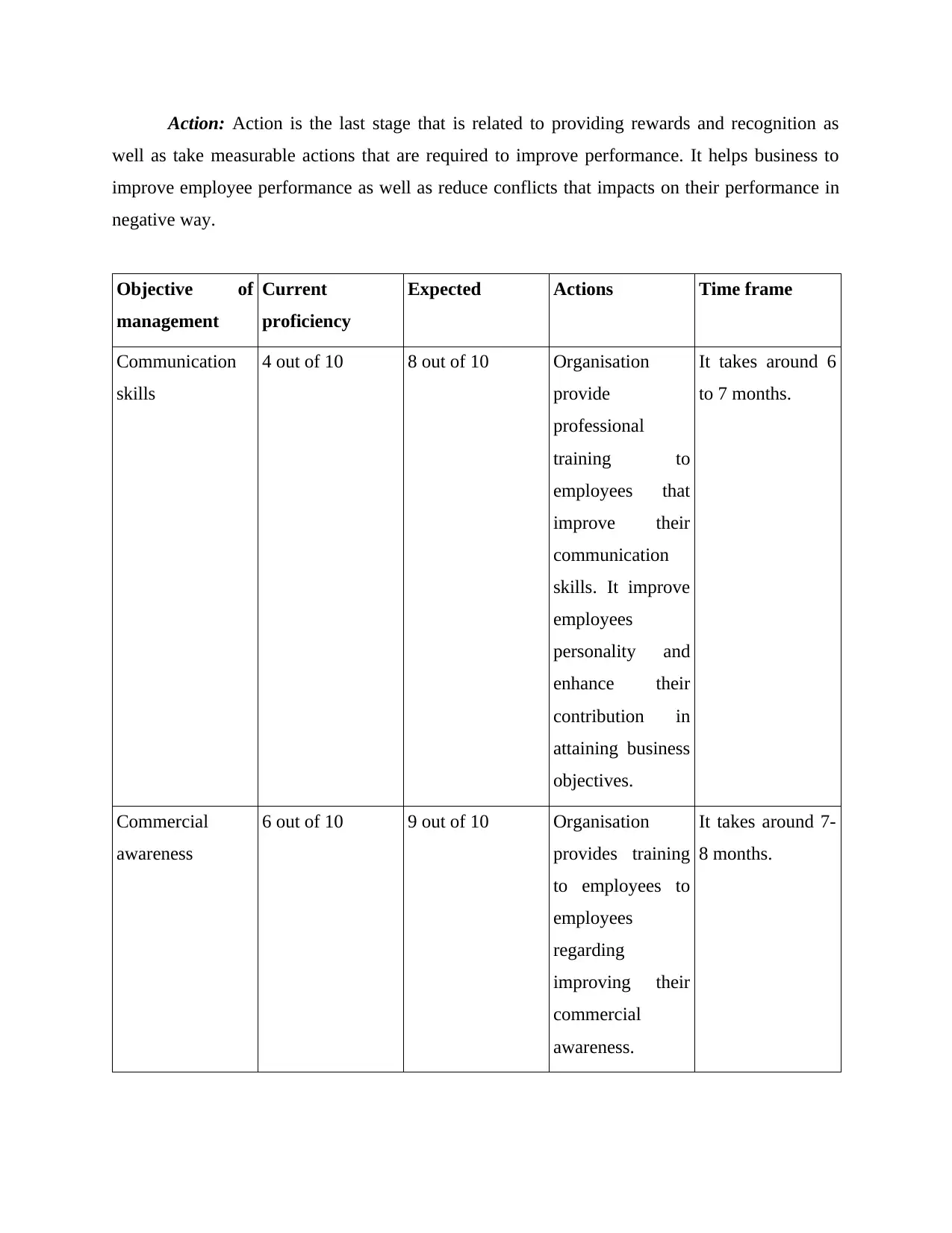
Action: Action is the last stage that is related to providing rewards and recognition as
well as take measurable actions that are required to improve performance. It helps business to
improve employee performance as well as reduce conflicts that impacts on their performance in
negative way.
Objective of
management
Current
proficiency
Expected Actions Time frame
Communication
skills
4 out of 10 8 out of 10 Organisation
provide
professional
training to
employees that
improve their
communication
skills. It improve
employees
personality and
enhance their
contribution in
attaining business
objectives.
It takes around 6
to 7 months.
Commercial
awareness
6 out of 10 9 out of 10 Organisation
provides training
to employees to
employees
regarding
improving their
commercial
awareness.
It takes around 7-
8 months.
well as take measurable actions that are required to improve performance. It helps business to
improve employee performance as well as reduce conflicts that impacts on their performance in
negative way.
Objective of
management
Current
proficiency
Expected Actions Time frame
Communication
skills
4 out of 10 8 out of 10 Organisation
provide
professional
training to
employees that
improve their
communication
skills. It improve
employees
personality and
enhance their
contribution in
attaining business
objectives.
It takes around 6
to 7 months.
Commercial
awareness
6 out of 10 9 out of 10 Organisation
provides training
to employees to
employees
regarding
improving their
commercial
awareness.
It takes around 7-
8 months.
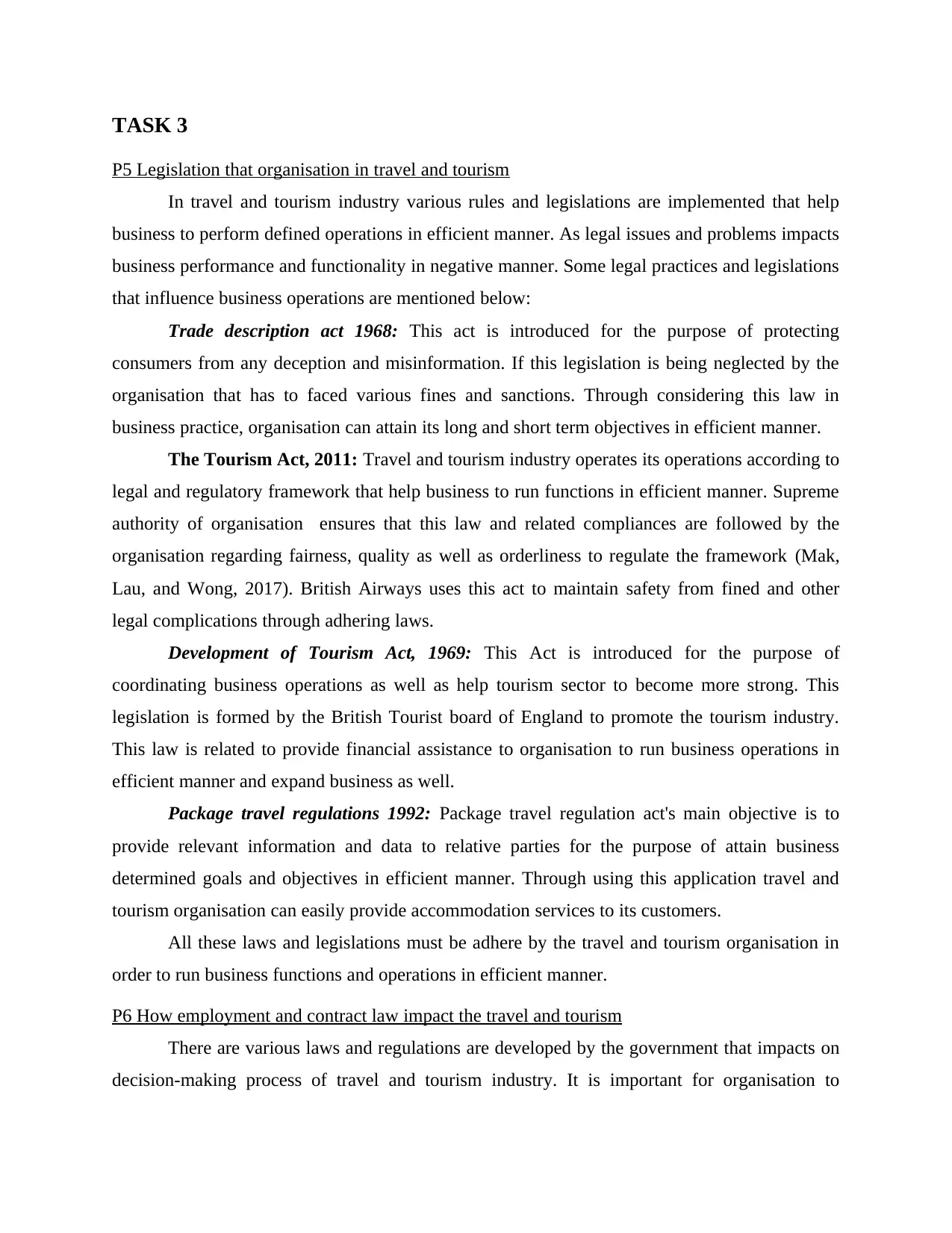
TASK 3
P5 Legislation that organisation in travel and tourism
In travel and tourism industry various rules and legislations are implemented that help
business to perform defined operations in efficient manner. As legal issues and problems impacts
business performance and functionality in negative manner. Some legal practices and legislations
that influence business operations are mentioned below:
Trade description act 1968: This act is introduced for the purpose of protecting
consumers from any deception and misinformation. If this legislation is being neglected by the
organisation that has to faced various fines and sanctions. Through considering this law in
business practice, organisation can attain its long and short term objectives in efficient manner.
The Tourism Act, 2011: Travel and tourism industry operates its operations according to
legal and regulatory framework that help business to run functions in efficient manner. Supreme
authority of organisation ensures that this law and related compliances are followed by the
organisation regarding fairness, quality as well as orderliness to regulate the framework (Mak,
Lau, and Wong, 2017). British Airways uses this act to maintain safety from fined and other
legal complications through adhering laws.
Development of Tourism Act, 1969: This Act is introduced for the purpose of
coordinating business operations as well as help tourism sector to become more strong. This
legislation is formed by the British Tourist board of England to promote the tourism industry.
This law is related to provide financial assistance to organisation to run business operations in
efficient manner and expand business as well.
Package travel regulations 1992: Package travel regulation act's main objective is to
provide relevant information and data to relative parties for the purpose of attain business
determined goals and objectives in efficient manner. Through using this application travel and
tourism organisation can easily provide accommodation services to its customers.
All these laws and legislations must be adhere by the travel and tourism organisation in
order to run business functions and operations in efficient manner.
P6 How employment and contract law impact the travel and tourism
There are various laws and regulations are developed by the government that impacts on
decision-making process of travel and tourism industry. It is important for organisation to
P5 Legislation that organisation in travel and tourism
In travel and tourism industry various rules and legislations are implemented that help
business to perform defined operations in efficient manner. As legal issues and problems impacts
business performance and functionality in negative manner. Some legal practices and legislations
that influence business operations are mentioned below:
Trade description act 1968: This act is introduced for the purpose of protecting
consumers from any deception and misinformation. If this legislation is being neglected by the
organisation that has to faced various fines and sanctions. Through considering this law in
business practice, organisation can attain its long and short term objectives in efficient manner.
The Tourism Act, 2011: Travel and tourism industry operates its operations according to
legal and regulatory framework that help business to run functions in efficient manner. Supreme
authority of organisation ensures that this law and related compliances are followed by the
organisation regarding fairness, quality as well as orderliness to regulate the framework (Mak,
Lau, and Wong, 2017). British Airways uses this act to maintain safety from fined and other
legal complications through adhering laws.
Development of Tourism Act, 1969: This Act is introduced for the purpose of
coordinating business operations as well as help tourism sector to become more strong. This
legislation is formed by the British Tourist board of England to promote the tourism industry.
This law is related to provide financial assistance to organisation to run business operations in
efficient manner and expand business as well.
Package travel regulations 1992: Package travel regulation act's main objective is to
provide relevant information and data to relative parties for the purpose of attain business
determined goals and objectives in efficient manner. Through using this application travel and
tourism organisation can easily provide accommodation services to its customers.
All these laws and legislations must be adhere by the travel and tourism organisation in
order to run business functions and operations in efficient manner.
P6 How employment and contract law impact the travel and tourism
There are various laws and regulations are developed by the government that impacts on
decision-making process of travel and tourism industry. It is important for organisation to
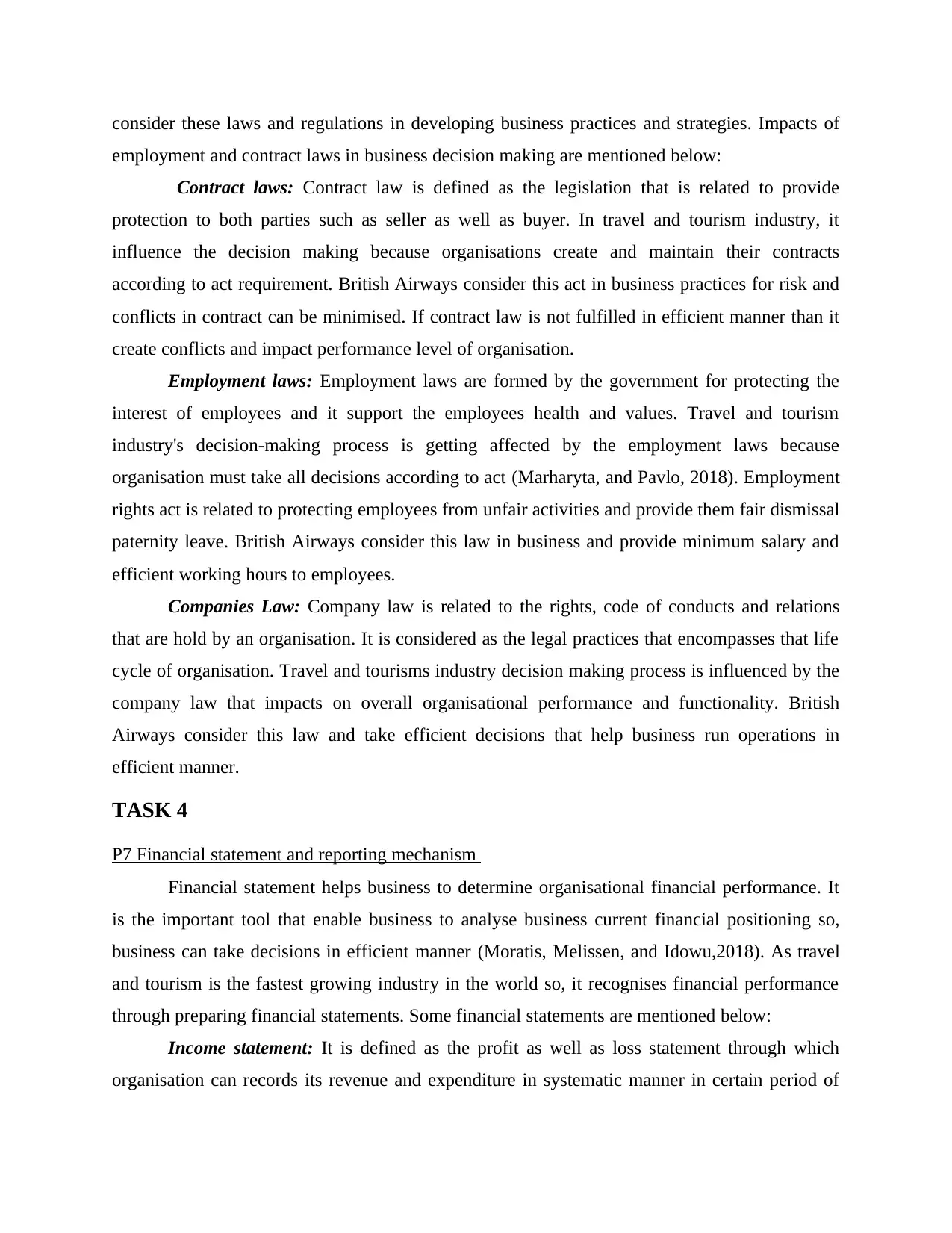
consider these laws and regulations in developing business practices and strategies. Impacts of
employment and contract laws in business decision making are mentioned below:
Contract laws: Contract law is defined as the legislation that is related to provide
protection to both parties such as seller as well as buyer. In travel and tourism industry, it
influence the decision making because organisations create and maintain their contracts
according to act requirement. British Airways consider this act in business practices for risk and
conflicts in contract can be minimised. If contract law is not fulfilled in efficient manner than it
create conflicts and impact performance level of organisation.
Employment laws: Employment laws are formed by the government for protecting the
interest of employees and it support the employees health and values. Travel and tourism
industry's decision-making process is getting affected by the employment laws because
organisation must take all decisions according to act (Marharyta, and Pavlo, 2018). Employment
rights act is related to protecting employees from unfair activities and provide them fair dismissal
paternity leave. British Airways consider this law in business and provide minimum salary and
efficient working hours to employees.
Companies Law: Company law is related to the rights, code of conducts and relations
that are hold by an organisation. It is considered as the legal practices that encompasses that life
cycle of organisation. Travel and tourisms industry decision making process is influenced by the
company law that impacts on overall organisational performance and functionality. British
Airways consider this law and take efficient decisions that help business run operations in
efficient manner.
TASK 4
P7 Financial statement and reporting mechanism
Financial statement helps business to determine organisational financial performance. It
is the important tool that enable business to analyse business current financial positioning so,
business can take decisions in efficient manner (Moratis, Melissen, and Idowu,2018). As travel
and tourism is the fastest growing industry in the world so, it recognises financial performance
through preparing financial statements. Some financial statements are mentioned below:
Income statement: It is defined as the profit as well as loss statement through which
organisation can records its revenue and expenditure in systematic manner in certain period of
employment and contract laws in business decision making are mentioned below:
Contract laws: Contract law is defined as the legislation that is related to provide
protection to both parties such as seller as well as buyer. In travel and tourism industry, it
influence the decision making because organisations create and maintain their contracts
according to act requirement. British Airways consider this act in business practices for risk and
conflicts in contract can be minimised. If contract law is not fulfilled in efficient manner than it
create conflicts and impact performance level of organisation.
Employment laws: Employment laws are formed by the government for protecting the
interest of employees and it support the employees health and values. Travel and tourism
industry's decision-making process is getting affected by the employment laws because
organisation must take all decisions according to act (Marharyta, and Pavlo, 2018). Employment
rights act is related to protecting employees from unfair activities and provide them fair dismissal
paternity leave. British Airways consider this law in business and provide minimum salary and
efficient working hours to employees.
Companies Law: Company law is related to the rights, code of conducts and relations
that are hold by an organisation. It is considered as the legal practices that encompasses that life
cycle of organisation. Travel and tourisms industry decision making process is influenced by the
company law that impacts on overall organisational performance and functionality. British
Airways consider this law and take efficient decisions that help business run operations in
efficient manner.
TASK 4
P7 Financial statement and reporting mechanism
Financial statement helps business to determine organisational financial performance. It
is the important tool that enable business to analyse business current financial positioning so,
business can take decisions in efficient manner (Moratis, Melissen, and Idowu,2018). As travel
and tourism is the fastest growing industry in the world so, it recognises financial performance
through preparing financial statements. Some financial statements are mentioned below:
Income statement: It is defined as the profit as well as loss statement through which
organisation can records its revenue and expenditure in systematic manner in certain period of
Secure Best Marks with AI Grader
Need help grading? Try our AI Grader for instant feedback on your assignments.
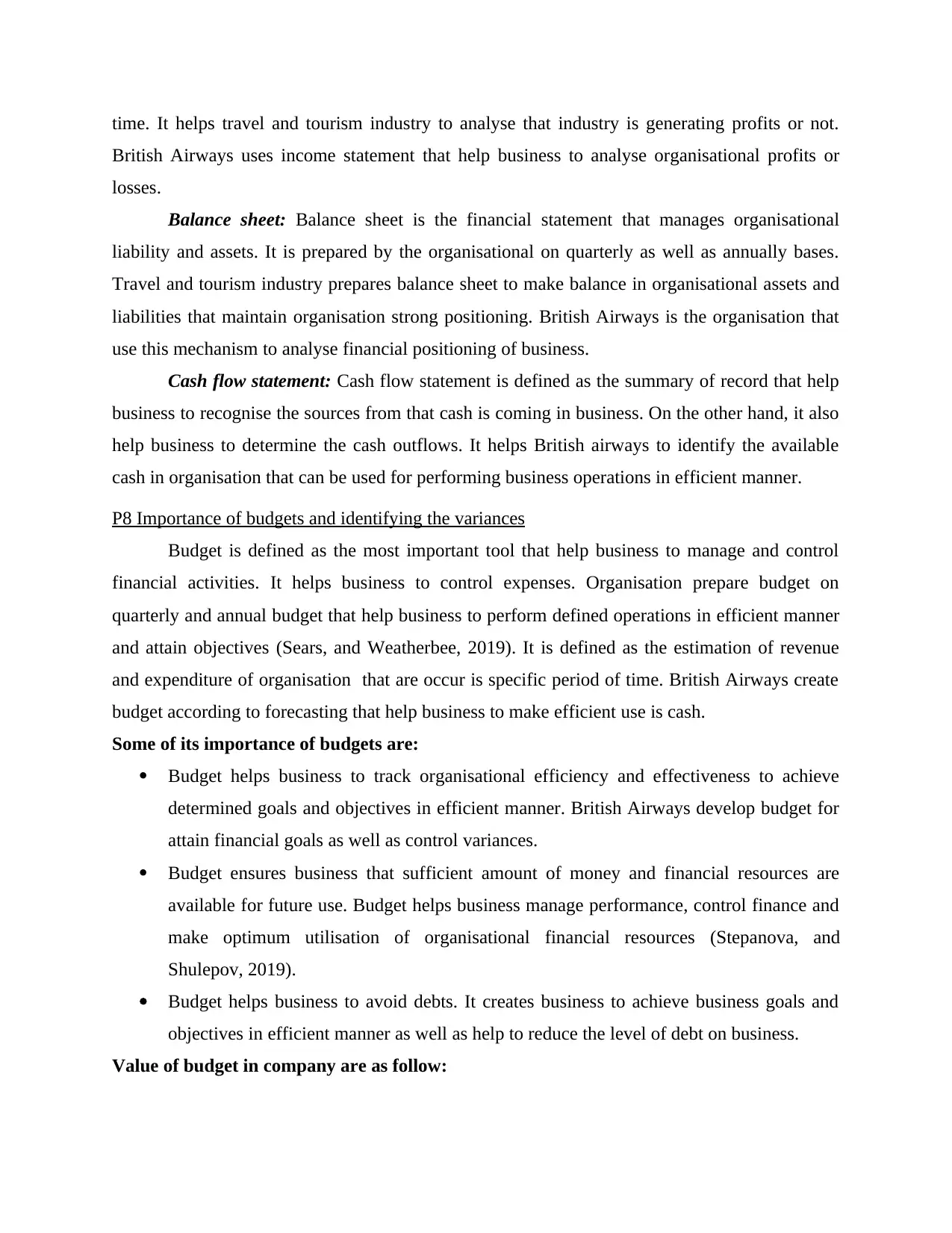
time. It helps travel and tourism industry to analyse that industry is generating profits or not.
British Airways uses income statement that help business to analyse organisational profits or
losses.
Balance sheet: Balance sheet is the financial statement that manages organisational
liability and assets. It is prepared by the organisational on quarterly as well as annually bases.
Travel and tourism industry prepares balance sheet to make balance in organisational assets and
liabilities that maintain organisation strong positioning. British Airways is the organisation that
use this mechanism to analyse financial positioning of business.
Cash flow statement: Cash flow statement is defined as the summary of record that help
business to recognise the sources from that cash is coming in business. On the other hand, it also
help business to determine the cash outflows. It helps British airways to identify the available
cash in organisation that can be used for performing business operations in efficient manner.
P8 Importance of budgets and identifying the variances
Budget is defined as the most important tool that help business to manage and control
financial activities. It helps business to control expenses. Organisation prepare budget on
quarterly and annual budget that help business to perform defined operations in efficient manner
and attain objectives (Sears, and Weatherbee, 2019). It is defined as the estimation of revenue
and expenditure of organisation that are occur is specific period of time. British Airways create
budget according to forecasting that help business to make efficient use is cash.
Some of its importance of budgets are:
Budget helps business to track organisational efficiency and effectiveness to achieve
determined goals and objectives in efficient manner. British Airways develop budget for
attain financial goals as well as control variances.
Budget ensures business that sufficient amount of money and financial resources are
available for future use. Budget helps business manage performance, control finance and
make optimum utilisation of organisational financial resources (Stepanova, and
Shulepov, 2019).
Budget helps business to avoid debts. It creates business to achieve business goals and
objectives in efficient manner as well as help to reduce the level of debt on business.
Value of budget in company are as follow:
British Airways uses income statement that help business to analyse organisational profits or
losses.
Balance sheet: Balance sheet is the financial statement that manages organisational
liability and assets. It is prepared by the organisational on quarterly as well as annually bases.
Travel and tourism industry prepares balance sheet to make balance in organisational assets and
liabilities that maintain organisation strong positioning. British Airways is the organisation that
use this mechanism to analyse financial positioning of business.
Cash flow statement: Cash flow statement is defined as the summary of record that help
business to recognise the sources from that cash is coming in business. On the other hand, it also
help business to determine the cash outflows. It helps British airways to identify the available
cash in organisation that can be used for performing business operations in efficient manner.
P8 Importance of budgets and identifying the variances
Budget is defined as the most important tool that help business to manage and control
financial activities. It helps business to control expenses. Organisation prepare budget on
quarterly and annual budget that help business to perform defined operations in efficient manner
and attain objectives (Sears, and Weatherbee, 2019). It is defined as the estimation of revenue
and expenditure of organisation that are occur is specific period of time. British Airways create
budget according to forecasting that help business to make efficient use is cash.
Some of its importance of budgets are:
Budget helps business to track organisational efficiency and effectiveness to achieve
determined goals and objectives in efficient manner. British Airways develop budget for
attain financial goals as well as control variances.
Budget ensures business that sufficient amount of money and financial resources are
available for future use. Budget helps business manage performance, control finance and
make optimum utilisation of organisational financial resources (Stepanova, and
Shulepov, 2019).
Budget helps business to avoid debts. It creates business to achieve business goals and
objectives in efficient manner as well as help to reduce the level of debt on business.
Value of budget in company are as follow:
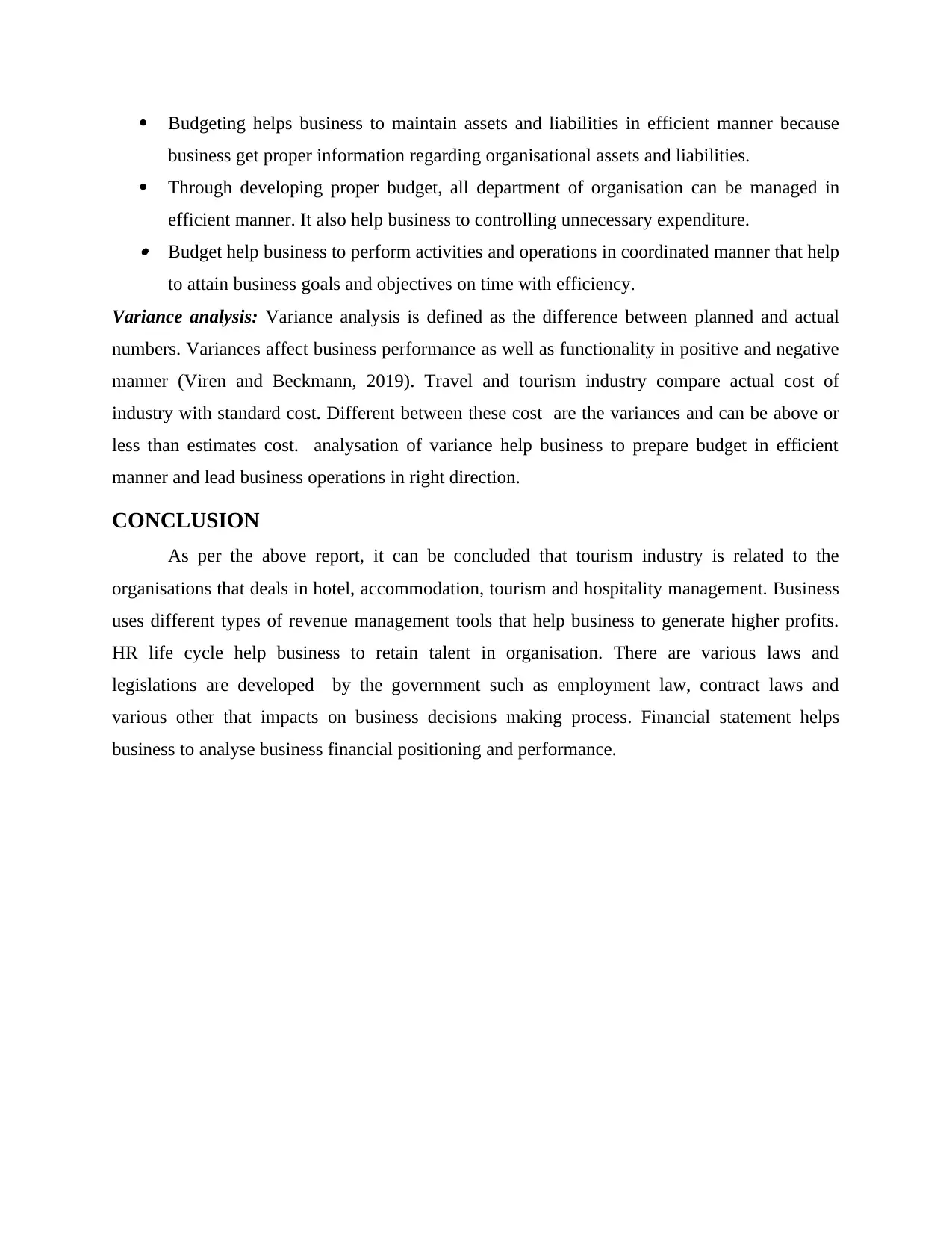
Budgeting helps business to maintain assets and liabilities in efficient manner because
business get proper information regarding organisational assets and liabilities.
Through developing proper budget, all department of organisation can be managed in
efficient manner. It also help business to controlling unnecessary expenditure. Budget help business to perform activities and operations in coordinated manner that help
to attain business goals and objectives on time with efficiency.
Variance analysis: Variance analysis is defined as the difference between planned and actual
numbers. Variances affect business performance as well as functionality in positive and negative
manner (Viren and Beckmann, 2019). Travel and tourism industry compare actual cost of
industry with standard cost. Different between these cost are the variances and can be above or
less than estimates cost. analysation of variance help business to prepare budget in efficient
manner and lead business operations in right direction.
CONCLUSION
As per the above report, it can be concluded that tourism industry is related to the
organisations that deals in hotel, accommodation, tourism and hospitality management. Business
uses different types of revenue management tools that help business to generate higher profits.
HR life cycle help business to retain talent in organisation. There are various laws and
legislations are developed by the government such as employment law, contract laws and
various other that impacts on business decisions making process. Financial statement helps
business to analyse business financial positioning and performance.
business get proper information regarding organisational assets and liabilities.
Through developing proper budget, all department of organisation can be managed in
efficient manner. It also help business to controlling unnecessary expenditure. Budget help business to perform activities and operations in coordinated manner that help
to attain business goals and objectives on time with efficiency.
Variance analysis: Variance analysis is defined as the difference between planned and actual
numbers. Variances affect business performance as well as functionality in positive and negative
manner (Viren and Beckmann, 2019). Travel and tourism industry compare actual cost of
industry with standard cost. Different between these cost are the variances and can be above or
less than estimates cost. analysation of variance help business to prepare budget in efficient
manner and lead business operations in right direction.
CONCLUSION
As per the above report, it can be concluded that tourism industry is related to the
organisations that deals in hotel, accommodation, tourism and hospitality management. Business
uses different types of revenue management tools that help business to generate higher profits.
HR life cycle help business to retain talent in organisation. There are various laws and
legislations are developed by the government such as employment law, contract laws and
various other that impacts on business decisions making process. Financial statement helps
business to analyse business financial positioning and performance.
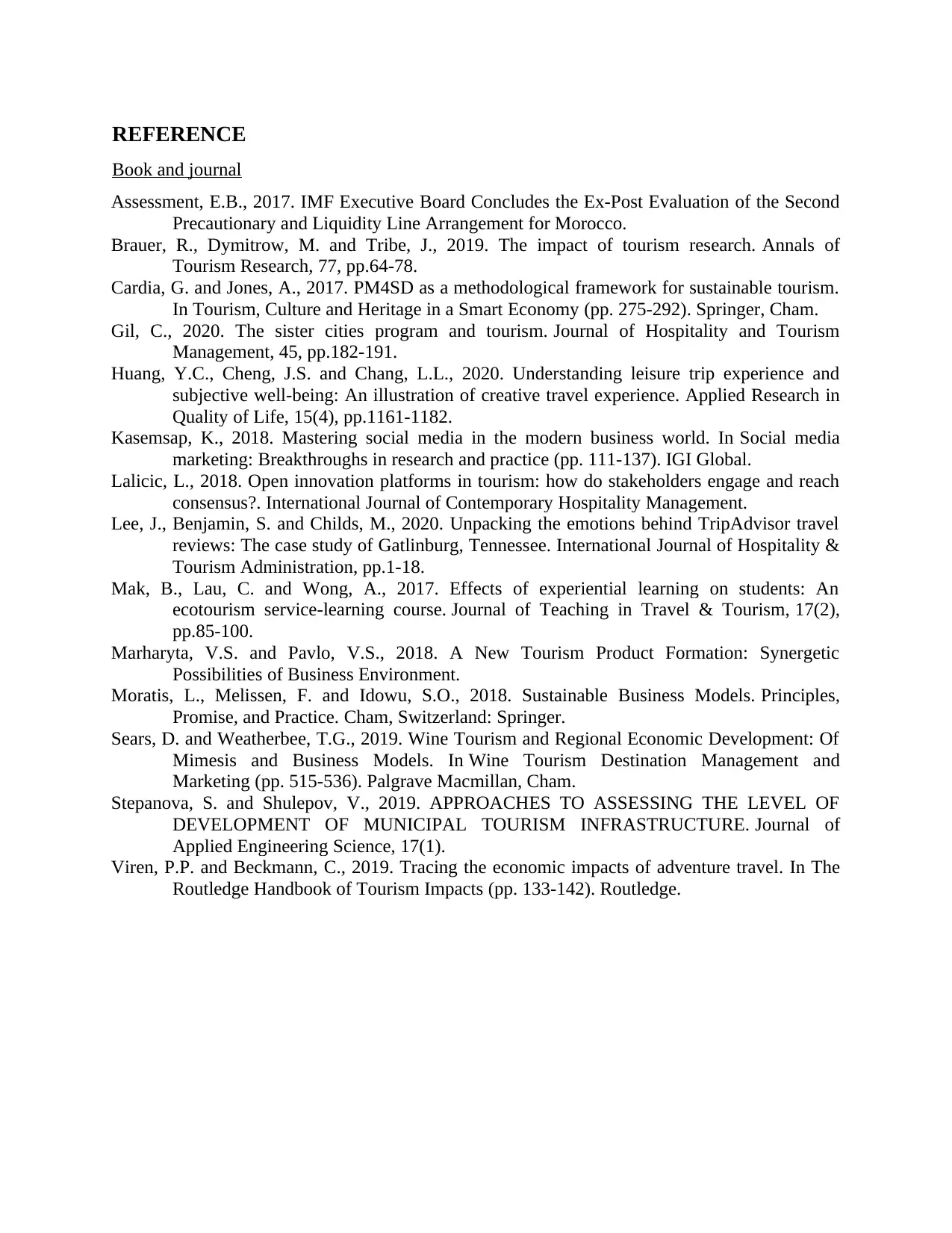
REFERENCE
Book and journal
Assessment, E.B., 2017. IMF Executive Board Concludes the Ex-Post Evaluation of the Second
Precautionary and Liquidity Line Arrangement for Morocco.
Brauer, R., Dymitrow, M. and Tribe, J., 2019. The impact of tourism research. Annals of
Tourism Research, 77, pp.64-78.
Cardia, G. and Jones, A., 2017. PM4SD as a methodological framework for sustainable tourism.
In Tourism, Culture and Heritage in a Smart Economy (pp. 275-292). Springer, Cham.
Gil, C., 2020. The sister cities program and tourism. Journal of Hospitality and Tourism
Management, 45, pp.182-191.
Huang, Y.C., Cheng, J.S. and Chang, L.L., 2020. Understanding leisure trip experience and
subjective well-being: An illustration of creative travel experience. Applied Research in
Quality of Life, 15(4), pp.1161-1182.
Kasemsap, K., 2018. Mastering social media in the modern business world. In Social media
marketing: Breakthroughs in research and practice (pp. 111-137). IGI Global.
Lalicic, L., 2018. Open innovation platforms in tourism: how do stakeholders engage and reach
consensus?. International Journal of Contemporary Hospitality Management.
Lee, J., Benjamin, S. and Childs, M., 2020. Unpacking the emotions behind TripAdvisor travel
reviews: The case study of Gatlinburg, Tennessee. International Journal of Hospitality &
Tourism Administration, pp.1-18.
Mak, B., Lau, C. and Wong, A., 2017. Effects of experiential learning on students: An
ecotourism service-learning course. Journal of Teaching in Travel & Tourism, 17(2),
pp.85-100.
Marharyta, V.S. and Pavlo, V.S., 2018. A New Tourism Product Formation: Synergetic
Possibilities of Business Environment.
Moratis, L., Melissen, F. and Idowu, S.O., 2018. Sustainable Business Models. Principles,
Promise, and Practice. Cham, Switzerland: Springer.
Sears, D. and Weatherbee, T.G., 2019. Wine Tourism and Regional Economic Development: Of
Mimesis and Business Models. In Wine Tourism Destination Management and
Marketing (pp. 515-536). Palgrave Macmillan, Cham.
Stepanova, S. and Shulepov, V., 2019. APPROACHES TO ASSESSING THE LEVEL OF
DEVELOPMENT OF MUNICIPAL TOURISM INFRASTRUCTURE. Journal of
Applied Engineering Science, 17(1).
Viren, P.P. and Beckmann, C., 2019. Tracing the economic impacts of adventure travel. In The
Routledge Handbook of Tourism Impacts (pp. 133-142). Routledge.
Book and journal
Assessment, E.B., 2017. IMF Executive Board Concludes the Ex-Post Evaluation of the Second
Precautionary and Liquidity Line Arrangement for Morocco.
Brauer, R., Dymitrow, M. and Tribe, J., 2019. The impact of tourism research. Annals of
Tourism Research, 77, pp.64-78.
Cardia, G. and Jones, A., 2017. PM4SD as a methodological framework for sustainable tourism.
In Tourism, Culture and Heritage in a Smart Economy (pp. 275-292). Springer, Cham.
Gil, C., 2020. The sister cities program and tourism. Journal of Hospitality and Tourism
Management, 45, pp.182-191.
Huang, Y.C., Cheng, J.S. and Chang, L.L., 2020. Understanding leisure trip experience and
subjective well-being: An illustration of creative travel experience. Applied Research in
Quality of Life, 15(4), pp.1161-1182.
Kasemsap, K., 2018. Mastering social media in the modern business world. In Social media
marketing: Breakthroughs in research and practice (pp. 111-137). IGI Global.
Lalicic, L., 2018. Open innovation platforms in tourism: how do stakeholders engage and reach
consensus?. International Journal of Contemporary Hospitality Management.
Lee, J., Benjamin, S. and Childs, M., 2020. Unpacking the emotions behind TripAdvisor travel
reviews: The case study of Gatlinburg, Tennessee. International Journal of Hospitality &
Tourism Administration, pp.1-18.
Mak, B., Lau, C. and Wong, A., 2017. Effects of experiential learning on students: An
ecotourism service-learning course. Journal of Teaching in Travel & Tourism, 17(2),
pp.85-100.
Marharyta, V.S. and Pavlo, V.S., 2018. A New Tourism Product Formation: Synergetic
Possibilities of Business Environment.
Moratis, L., Melissen, F. and Idowu, S.O., 2018. Sustainable Business Models. Principles,
Promise, and Practice. Cham, Switzerland: Springer.
Sears, D. and Weatherbee, T.G., 2019. Wine Tourism and Regional Economic Development: Of
Mimesis and Business Models. In Wine Tourism Destination Management and
Marketing (pp. 515-536). Palgrave Macmillan, Cham.
Stepanova, S. and Shulepov, V., 2019. APPROACHES TO ASSESSING THE LEVEL OF
DEVELOPMENT OF MUNICIPAL TOURISM INFRASTRUCTURE. Journal of
Applied Engineering Science, 17(1).
Viren, P.P. and Beckmann, C., 2019. Tracing the economic impacts of adventure travel. In The
Routledge Handbook of Tourism Impacts (pp. 133-142). Routledge.
1 out of 13
Related Documents
Your All-in-One AI-Powered Toolkit for Academic Success.
+13062052269
info@desklib.com
Available 24*7 on WhatsApp / Email
![[object Object]](/_next/static/media/star-bottom.7253800d.svg)
Unlock your academic potential
© 2024 | Zucol Services PVT LTD | All rights reserved.





